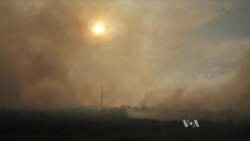Last year some of the biggest fires in recorded history raged through Indonesia, sending a haze of smoke across the region and pumping enormous quantities of carbon dioxide into the atmosphere. One culprit was the palm oil industry. With the fire season set to begin again, exacerbated by the El Nino weather pattern, efforts to reform the industry will soon be put to the test.
Strong international demand for palm oil to use in snack foods and cosmetics has made the cash crop a ubiquitous sight across millions of hectares in Indonesia.
Much of where palms grow was once peatland. It was dried for agriculture in the cheapest and quickest way possible – illegal draining and burning.
This practice has fueled some of the worst fires in recorded history, creating a haze so enormous it spreads to neighboring countries and can release more carbon dioxide than the entire United States.
Woro Supartinah runs The Network for Riau Forest Rescue, a non-governmental organization that tracks fires and deforestation through satellite data and community monitors.
“Dried peatland has become the gasoline for any triggers for the fires," said Supartinah. "Riau province has lost around five million hectares of natural forest. Now, currently we only have 1.6 million [hectares] of natural forest from seven million that we had in late of eighties.”
But for the first time, plantation policing has stopped the fires, said Edwar Sanger, head of the National Disaster Management Authority in Riau.
“[Even] if there is an El Nino effect [this year], we have already made a commitment that what had happened in the past years will not happen again,” said Sanger.
Pak Dahlan has worked with the government to minimize the environmental impact of his community’s 1,000 hectare palm plantation in Dosan village.
By blocking canals once used to drain their plantation, they can let the palms grow, but keep the land sufficiently moist to minimize fire risk.
“During that time [that we planted] palm oil plantation in this village it was still a new thing. We didn’t know how extensive the impact was. We only realized its impact now,” said Pahlan.
The community has its own firefighters. And for the sake of future generations, they compost palm branches to rejuvenate the soil.
Other communities in Riau are experimenting with similar strategies and are even cutting down parts of their own palm plantations to plant a more diversified mix of crops.
With the worst fire season set to hit soon, these efforts will be put to the test.





